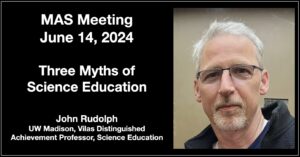Three Myths of Science Education

Few people question the importance of science education in American schooling. It’s the key, after all, to economic growth, develops the ability to reason more effectively, and enables us to solve everyday problems. Good science teaching results in all these benefits and more—or so we think. But what if all this is simply wrong? What if the benefits we assume science education produces turn out to be an illusion, nothing more than wishful thinking? In this talk, Rudolph will examine the reasons we’ve long given for teaching science and assesses how they hold up to what we know about what students really learn in science classrooms and what research tells us about how people actually interact with science in their daily lives. The results may be surprising. Instead of more and more rigorous traditional science education to fill the STEM pipeline, Rudolph will challenge us to think outside the box of traditional instruction and make the case for an expansive science education aimed instead at rebuilding trust between science and the public—something desperately needed in our current era of impending natural challenges and science denial
John L. Rudolph is the Vilas Distinguished Achievement Professor of Science Education at the University of Wisconsin-Madison. His main area of research focuses on the history of science education in American high schools. He also writes about issues related to the nature of science in the present-day school curriculum and on how the history, philosophy, and sociology of science have been used in science education research. He received his Ph.D. from the University of Wisconsin-Madison in curriculum and instruction and history of science. Prior to his current appointment, he spent a number of years teaching physics, chemistry, and biology in middle schools and high schools across Wisconsin. He is past editor-in-chief of the Wiley & Sons journal Science Education and a National Academy of Education/Spencer Postdoctoral Fellow.
This meeting will take place in person at our usual Space Place classroom location. It will also be streamed live to our YouTube channel at https://www.youtube.com/@madisonastronomicalsociety.
